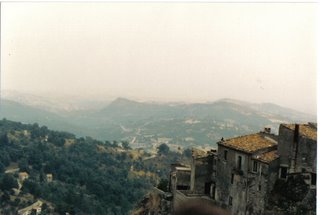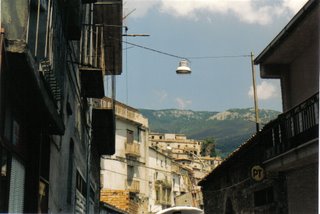
Monday, July 31, 2006
Sunday, July 30, 2006
Thursday, July 27, 2006
Wednesday, July 26, 2006
You Gotta Minute...
Tuesday, July 25, 2006
If I Had a Hammer………I’d Hammer Out a Chapbook Manuscript
Alright, so after weeding out more than half a dozen poems or so that just didn’t cut it - I’ve got about 25 poems that I’m comfortable sending out into the gauntlet of publishers and publishing houses. But it’s hard sending out these ingénue pomes out onto the literary seas without a rudder (so to speak). They need a captain at the helm that can steer the course to publication. I was imagining myself as Humphrey Bogart from “African Queen”, but am probably closer to being a Captain Merrill Stubing instead!
In an attempt to fulfill my navigational duties I’m trying to discern a common theme that runs throughout. The best I could come up with is that it was all written by the same schmuck. So I really tried to get into my work. Translation: I made hardcopies threw them on the floor and moved them around from one pile to another. This served as both meditation and my daily exercise. And as a bonus the hardwood floor got buffed.
I stared at them so long; I imagined them staring back. Then a thought popped into my head. This condition can be dangerous as thoughts do not generally make their way into my synaptic network due to the misfiring of my dendrites. (I knew I should have changed those spark plugs at 40K.)
After the synapses finally fired, what I came up with is that all poetry usually falls within broader categories. Duh! So why not just lump the poems according to their subject matter? I came up with this schema:
Death & Mysticism
Faith & Religion
The Surrealistic
Significant Others
The Human Condition
Self-Identification
You’ll notice that nature doesn’t play a big part in my poetry writing. It’s not that I’m not a naturalist or don’t appreciate nature; it’s just that the closest I get to nature is my father’s San Marsano tomato plants. Check that...Make that my father's San Marsano tomatoes!
What I’m wondering - just about now - is what other poets in the blogosphere primarily write about. Do we inevitably all end up writing about the same things? Hmm… Maybe Jung was on to something after all!
Wednesday, July 19, 2006
Arabesques Review Vol. II Issue 02

Arabesques Review Vol. II Issue 02 - ($13.95)
Includes writers such as Bill Teitelbaum, Sheila Murphy, Joseph Farina, Gordon Massman, Brent Powers, Ross Clark, Cortney Bledsoe, Ron Savage, Thomas Aiello, Steve Mayoff, JA Tyler, Nick Bruno, David Taylor, Owen Elmore, Davide Trame, Socorro Venegas, Les Merton, Carl Palmer, Mary Hamrick, Michael Blottenberger, Christopher Woods, Penny Feeny, Jose Manuel Sevilla, Jai Clare, Gary Lehmann, Paul Murphy, Leonardo Guevara Navarro, Azza El Wakeel, Christopher Woods, Lucia Leao, Jason Heroux, Dimitris Kraniotis, Domenico Capilongo and Arash Farzanah all appear in the pages of Arabesques' new special "Anthology" issue. "Identities" is a unique "cultural book" which has been published with the contributions of many talented artists from all corners of the planet.
Sunday, July 16, 2006
Saturday, July 15, 2006
Wednesday, July 12, 2006
Tuesday, July 11, 2006
I’m Still a Virgin…
When it Comes to Publishing a Chapbook or a “Full Length” Collection of Poetry.
By the way what the hell is a “full length” collection anyway? Are we talking poems or pages here? Does one really long poem (100+ pages) constitute a “full length” collection or not? How about 300 haikus? What about the term “chapbook”? The term always sounded kind of uncomfortable if you ask me. It sounds as if I should be applying some kind of balm to it; or take the poor thing to see a dermatologist. Never mind…. In any case, I now have enough published poems to put together a manuscript for a “chapbook”.
Thing is I’ve only been at this “PoBiz” for about five years. Furthermore, I never thought when I started out that I’d ever even be published in poetry journals, let alone entertain the prospect that my work might appear in a book of poetry or an anthology. For me it has always been about the poetry. I never really was in a hurry to publish a chapbook or collection, just for the sake of publishing! I mean – yeah… I’d like the look of my moniker imprinted in bold letters on several hundred copies of an expertly bound, exquisitely presented chapbook. But then again who wouldn’t?
This has been an interesting journey. On my return from Italy in 2000, I started out posting & critiquing poetry on-line. The venues I frequented are too many to name here. But it wasn’t until I started posting at the Gazebo that I really got a kick in the proverbial poetic shins. The experience kick-started my enduring interest in poetry. During the 3 odd years that I participated there I published quite a few poems. I am not a prolific writer, by any stretch of the imagination, but I was fortunate enough to have most of my poems find a home as it were.
Now 35+ published poems later, I feel like I have enough material for a chapbook. Problem is - & I’m serious about this – I really need some help with putting together a manuscript. The poems only span five years of writing but I believe that my writing style & voice really changed over that short period of time. Therefore, I’m not really sure if & how to incorporate these varied stages of development into a marketable manuscript. So, if you’re interested in a challenge, boy have I got one for you!
------------------------------------------------
Addendum: For readers requiring further explication of the marketing of the Chapbook - the following article from Pudding House Press might be of interest: Chapbooks — Flying Like Hummingbirds Exciting the Air Around Them (MARKETING YOUR CHAPS WITH LIMITED IF ANY HELP FROM THE PUBLISHER) can be found in the main directory under the heading: "Chapbook Marketing a How-To"!
Sunday, July 09, 2006
That's Just The Way it Goes.
Well, I know one journal that I will be considering for future submissions. Actually, here is the lineup of poets in the recent edition:
Rob Baum, Jared Carter, Iris Dunkle, Joseph Farina, Larry Fontenot, Giles Goodland, Anne Haines, Zoë Landale, Alexander Long, Harold Lorin, Benjamin Morris, Patrick Rosal.
Great lineup. Check it out!
Friday, July 07, 2006
"We don't see things as they are we see things as we are." (Anais Nin)
THE VOICE YOU HEAR WHEN YOU READ SILENTLY
by Thomas Lux
is not silent, it is a speaking-
out-loud voice in your head: it is spoken,
a voice is saying it
as you read. It's the writer's voice,
of course, in a literary sense
his or her "voice" but the sound
of that voice is the sound of your voice.
Not the sound your friends know
or the sound of a tape played back
but your voice
caught in the dark cathedral
of your skull, your voice heard
by an internal ear informed by internal abstracts
and what you know by feeling, having felt. It is your voice
saying, for example, the word "barn"
that the writer wrote
but the "barn" you say
is a barn you know or knew. The voice
in your head, speaking as you read,
never says anything neutrally -- some people
hated the barn they knew,
some people love the barn they know
so you hear the word loaded
and a sensory constellation is lit: horse-gnawed stalls,
hayloft, black heat tape wrapping
a water pipe, a slippery
spilled chirrr of oats from a split sack,
the bony, filthy haunches of cows . . .
And "barn" is only a noun -- no verb
or subject has entered into the sentence yet!
The voice you hear when you read to yourself
is the clearest voice: you speak it
speaking to you.
--------------------------------------------------------------
From : New and Selected Poems of Thomas Lux : 1975-1995 (Mariner Books)
Tuesday, July 04, 2006
Three of my Poems Get Picked up.
Monday, July 03, 2006
"McPoems"
Donald Hall calls these workshop generations, "McPoems." As Doug Treem once said, "It's like using McDonald's to rid the world of hunger." One cannot cure society's ills by force feeding them food lacking in substance". Rather, we hear Kenneth Patchen's admonishment: "The one who comes to question himself has cared for mankind." Poets must search within themselves in order to tap into the Muse and allow it to flourish in their lives and more importantly in the life of their poetry. It is this inward going, as Rainer Maria Rilke admonishes when he says "go into yourself," that is missing in contemporary American poetry. "
----------------— Raymond P. Hammond: Editor of The NewYork Quarterly
Sunday, July 02, 2006
Poetry by Committee?
What is implicit in the query is the importance of the process of revision that every poet must face when considering an early draft of a poem or one that is in the “not just there yet” category. The question here is: Is feedback a necessary evil (or an evil at all for that matter)? Some of the poets that responded to the question believe that a reader’s reaction to their work is beneficial while others would rather figure it out themselves trying to exclude the possibility that their poetry be tinged (tainted?) by an outside source.
Is a poem that we receive feedback to - no longer “our” poem? Do we sacrifice originality, perhaps even our voice & style - when we open the door to outside critique? What role, if any, should critique of our poetry play in the creative process? Or is critique “anti-creative” leading to a “poetry by committee” paradigm? These concerns all crossed my mind during my scrutiny of the issue.
Yet poets have been critiquing each other’s work for centuries. Surely, this poetic tradition cannot be valueless. I hope to come back to this & post a further analysis.









